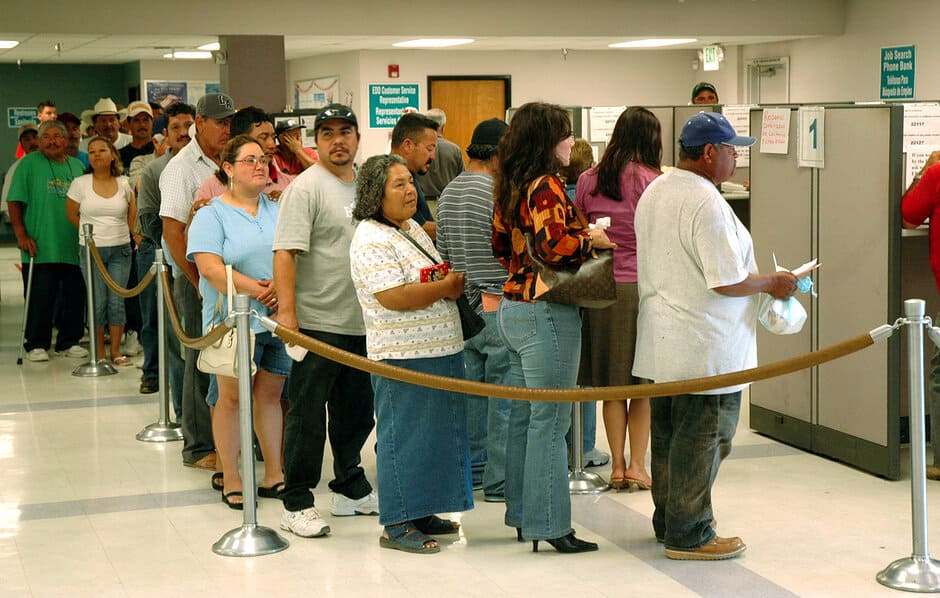
Kevin Vazquez is a staff attorney at the International Brotherhood of Teamsters. He graduated from Harvard Law School in 2023. The opinions he expresses on this blog are his own and should not be attributed to the IBT.
On Monday, a survey published by Data for Progress showed that voters prioritize creating jobs over inflation and the national debt. According to the survey, a majority of voters – including both independents and Republicans – “strongly prioritize investing in the economy over concerns about inflation and price hikes” when asked whether they consider jobs and wages or maintaining low prices to be more important. Overall, 59 percent of voters said they consider jobs and wages more important, and, perhaps most strikingly, the difference was not especially stark along partisan lines: 64 percent of voters identifying as independents said inflation was the less important concern, along with 51 percent of Republicans. This is, of course, out of step with decades of either party’s policy agenda, which has long prioritized low inflation – and its attendant benefits for the wealthy, whose asset values would be eroded by an inflationary period – over full employment, which would predominantly benefit workers, particularly “low skill” and low-income workers, by forcing employers to compete for scarce labor. There is evidence, however, that COVID is transforming American fiscal policy, and President Biden has announced in no uncertain terms that he aims for “full employment” – a radical departure from decades of settled policy. Indeed, the American Jobs Plan, which, despite warnings from a familiar chorus of inflation fearmongers, pumped nearly $2 trillion into the economy, signals a clear rejection of traditional fiscal thinking; but to truly transform fiscal and economic policy in the United States, there remains much work to be done.
In other Monday news, Randy Korgan, the Teamsters’ “national director for Amazon” and Secretary-Treasurer of Teamsters Local 1932, published a piece in Salon calling Amazon Teamsters’ “enemy No. 1” and asserting that the Teamsters is committed to “building genuine working power at Amazon” through “shop-floor militancy” and “solidarity from warehousing and delivery Teamsters.” The union, he says, is training its members to support Amazon workers who are organizing across the country, and the piece calls for building “large volunteer organizing communities” and “strong community-labor alliances” to combat the growing threat posed by Amazon. The Teamsters have been hinting at a confrontational – if not outright militant – national project aimed at Amazon for most of 2021, and Teamsters-led organizing campaigns are already underway in a number of Amazon facilities throughout the country. As if to illustrate the need for such action, Amazon launched a “workplace-safety pledge” over the weekend, promising to address its warehouse-injury rate, which, as noted by a labor coalition earlier this month, is far greater than that of its competitors. The company, which is valued at more than $1.5 trillion and made more than $20 billion in profit last year, pledged a paltry $12 million to the effort – and has already announced that it will not change its onerous system of performance metric for workers, which sets per-hour productivity targets, which, workers say, is responsible for many of the company’s workplace injuries.
Over the weekend, the enhanced federal unemployment benefits – including, primarily, the $300 federal supplement to weekly unemployment checks – ended for nearly 500,000 workers in four Republican-led states on Saturday, the first to officially abandon the Pandemic Unemployment Assistance program. Republican lawmakers in Mississippi, Iowa, Alaska, and Missouri – citing, among other justifications, the nationwide “labor shortage” in their defense – scrapped the federal unemployment insurance that had been and remains critical for millions of low-wage workers across the country. These states are merely the first of many: Twenty-five, all controlled by Republicans, are foregoing federal unemployment assistance this summer, which will ultimately strip nearly four million workers of aid, plunging many of them back into the precarity and insecurity occasioned by the pandemic. President Biden, unlike some other Democrats, such as Sen. Bernie Sanders, and many economists, who argue that the government has a legal (not to mention moral) obligation to distribute aid to struggling workers during the pandemic, has seemed largely receptive to these Republican efforts so far, saying it “makes sense” for the aid to expire on Labor Day and that Republican governors have “every right” to cancel the programs. In the real world, however, food banks throughout the country are bracing for increased demand for food aid, which has surged during the pandemic, as the federal assistance expires – demonstrating, perhaps, the fecklessness and irrationality of cutting the benefits. It is another reminder that, although the public health crisis may plausibly be coming to a conclusion, the corresponding economic crisis and dislocation created by the pandemic is far from over.
On Sunday, the Wall Street Journal, quoting data from the Labor Department, reported that more American workers are quitting their jobs and pursuing new opportunities than at any point in the last two decades. According to the Labor Department report, 2.7 percent of American workers left their jobs in April – a stark rise from where it stood last April, at 1.6 percent, and the highest level since at least 2000. Workers are shifting into new jobs and careers; a shift, the Journal says, that is being driven by several factors. The aftermath of the pandemic, of course, lingers in the background of virtually all of them. The switch to remote work has increased opportunities for some workers, but perhaps even more importantly, enhanced unemployment benefits, especially when paired with government stimulus boosts to certain sectors of industry, like hospitality and manufacturing, have provided many with increased flexibility, stability, and relative bargaining power, which they have used to abandon exploitative jobs and pursue better opportunities elsewhere.
Relatedly, also on Sunday, an interesting New York Times opinion piece penned by Ezra Klein, a co-founder and the former editor of Vox, entitled “What the Rich Don’t Want to Admit About the Poor,” offers a rare glimpse in a major American newspaper into many of the unspoken background truths about the American economy that distort national conversations about poverty, wealth, and work. “The American economy runs on poverty, or at least the constant threat of it,” Klein writes. “Americans like their goods cheap and their services plentiful and the two of them, together, require a sprawling labor force willing to work tough jobs at crummy wages.” The piece, written largely in response to the labor shortage hysteria ginned up by conservative media outlets and Republican policymakers, argues that it is not merely conservatives but also the financial press, cable news, and even many influential figures on the center-left who constantly over fret over supposed labor shortages or inflation risk with an intensity that they rarely bring to bear on the “ongoing agonies of poverty or low-wage toil.” This, Klein argues, is because the American economy is dependent on the exploitation of low-income workers, who, if empowered (as they were, albeit only minimally, by the enhanced federal employment benefits), would have a greater capacity to reject exploitative, undesirable – but, for the wealthy, also highly profitable – work, upending our society’s fragile economic order, which is built on implicit coercion. To demonstrate this proposition, Klein explores a policy proposal developed by the New School’s Institute on Race and Political Economy, called “A Guaranteed Income for the 21st Century,” which would guarantee a $12,500 annual income for every adult, in addition to a $4,500 allowance for every child – a “negative income tax” plan that phases out as household income rises. The problem with this proposal, Klein says, is not the costs – but the benefits. It would embolden low-income workers and thereby threaten our economic order. The country’s high rate of poverty is not some preordained or natural outcome; it is a policy decision made by the powerful because it benefits them. “[T]hose in the economy with the power to do the dictating profit from the desperation of low-wage workers. One man’s misery is another man’s quick and affordable at-home lunch delivery.” (For a vivid illustration of this contention, see this piece published on Sunday in the Guardian, chronicling the continued struggles of “essential workers” as coronavirus restrictions are lifted, many of whom remain fearful and are still fighting for minimal improvements to wages and benefits.)






Daily News & Commentary
Start your day with our roundup of the latest labor developments. See all
January 5
Minor league hockey players strike and win new deal; Hochul endorses no tax on tips; Trump administration drops appeal concerning layoffs.
December 22
Worker-friendly legislation enacted in New York; UW Professor wins free speech case; Trucking company ordered to pay $23 million to Teamsters.
December 21
Argentine unions march against labor law reform; WNBA players vote to authorize a strike; and the NLRB prepares to clear its backlog.
December 19
Labor law professors file an amici curiae and the NLRB regains quorum.
December 18
New Jersey adopts disparate impact rules; Teamsters oppose railroad merger; court pauses more shutdown layoffs.
December 17
The TSA suspends a labor union representing 47,000 officers for a second time; the Trump administration seeks to recruit over 1,000 artificial intelligence experts to the federal workforce; and the New York Times reports on the tumultuous changes that U.S. labor relations has seen over the past year.